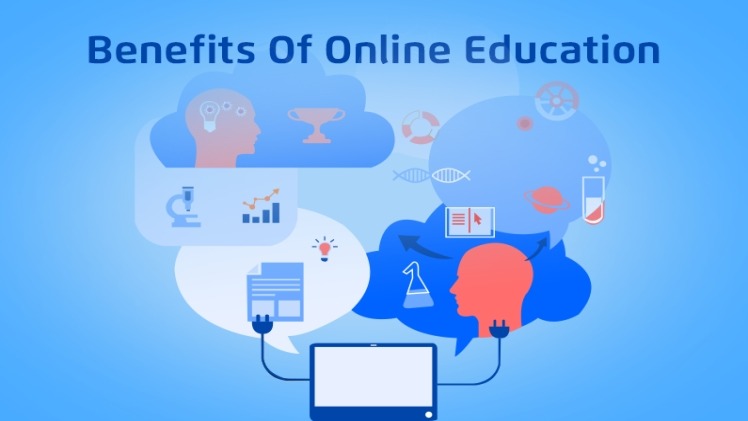Top Benefits of Online Learning – 10 Reasons to Embrace Virtual Education

Top Benefits of Online Learning – 10 Reasons to Embrace Virtual Education
In the digital age, online learning continues to transform education. From busy professionals to global learners, more people are asking: What are the advantages of online learning? This article outlines the advantages of online learning, the benefits of online education, and the top 10 reasons to embrace virtual classes.
✅ 1. Flexibility & Self‑Paced Learning
Online learning allows students to study anytime and anywhere, fitting education around work, family, or holidays. Course materials and lectures are often recorded for repeat viewing. This makes it easy to pause, rewind, or catch up at your convenience. This flexibility supports different time zones and life schedules.
✅ 2. Cost-Effectiveness & Affordability
Without relocation, commuting, or campus fees, online education drastically reduces costs. Many programs also deliver digital materials instead of expensive textbooks. Compared to on-campus learning, online courses often offer lower tuition and reduced overhead.
✅ 3. Broader Program Access & Course Selection
Online learners can access courses and degrees from top institutions worldwide—even from home. This opens fields that may not exist locally or in physical campuses. Platforms like MOOCs provide diverse programming at all levels.
✅ 4. Personalized Learning & Adaptive Content
Adaptive learning platforms tailor course material to individual learning styles and pace. You can focus more time on challenging topics and progress faster through mastered content. Many platforms include tools like simulations, quizzes, and interactive media to reinforce understanding.
✅ 5. Career Advancement and Skill Development
Online learning is ideal for professionals aiming to upskill or shift careers. Students can maintain employment while earning credentials that boost employability and salary prospects. Immediate practical application of coursework enhances performance in real-time.
✅ 6. Improved Digital & Technical Skills
Through online education, students become fluent in technologies like Zoom, Slack, and learning platforms such as Canvas—all increasingly relevant in remote or hybrid professions. These digital skills are transferable and highly valued across industries.
✅ 7. Global Networking Opportunities
Virtual classrooms bring together learners from diverse cultural, educational, and geographical backgrounds. This fosters global collaboration, cultural awareness, and broader perspectives—preparing students for global teams and diverse workplaces.
✅ 8. Development of Self‑Discipline & Time Management
Online learning places responsibility on students to manage coursework and deadlines autonomously. This nurtures self-discipline, organizational skills, and accountability—traits valued both academically and professionally.
✅ 9. Environmental & Sustainability Benefits
By reducing commuting, paper use, and energy used in physical classrooms, online learning offers a smaller carbon footprint. It supports sustainability goals and eco-conscious education.
✅ 10. Lifelong Learning & Career Flexibility
Online education supports continuous growth—from professional certificates to personal interests—without needing full-time enrollment. Lifelong learners can access micro-credentials, MOOCs, and short courses at any stage in life.
14 Great Benefits of Online Learning (Expanded)
Beyond the core 10, other advantages include:
- 24/7 Access to Resources (videos, transcripts, forums)
- Barrier Reduction for Special Needs or Health Challenges—online formats support neurodiverse and medically vulnerable learners.
- Global Reach for Students in Rural or Underserved Regions.
- Increased Student Attendance & Completion due to flexible format.
Emerging Trends & Future Promise of Virtual Education
- AI-driven personalization enables adaptive learning based on strengths and weaknesses.
- Lifelong learning pathways and micro-credentials make reskilling or portfolio shifts easier.
- Schools like Virtual School Victoria (Australia) have seen a 63% increase in enrolments, particularly from students seeking flexible or neurodivergent-friendly setups.
- Monash University’s online support emphasises mental health and resilience tools alongside content, helping students thrive.
Potential Limitations & How to Mitigate Them
Online learning also has challenges:
- Lower engagement or motivation without structured in-person interaction
- Limited hands-on or lab-based experiences for certain disciplines
- Tech requirements & access disparities—not all students have reliable devices or Internet
- Feelings of isolation or limited social connection without proactive community-building
These can be mitigated via peer forums, virtual group work, synchronized sessions, or blended hybrid models.
Conclusion: Embrace Virtual Education with Confidence
The benefits of online learning are compelling: affordability, flexibility, access to world-class educators, career advancement, improved digital literacy—and even environmental sustainability. For professionals, parents, adult learners, or anyone seeking flexible education, the advantages of online education far outweigh remaining barriers.
If you’re aiming to balance life with learning, skill up effectively, or access global educational networks—online learning is worth embracing.
FAQs
What are the main advantages of online classes?
They offer unmatched flexibility, cost savings, global access, personalized pacing, and career-relevant skill-building.
How does online learning benefit professionals?
It lets them upskill without pausing jobs, apply learning directly at work, and earn credible certifications that advance careers.
Can online learning improve time management skills?
Absolutely—students must plan coursework independently, improving discipline and organization.
Is online education more affordable than traditional?
Yes—students save on housing, commuting, campus fees, and textbooks, making it often cheaper overall.
Does online learning offer networking with others globally?
Yes. Virtual classrooms connect learners worldwide, fostering diverse perspectives and global networking opportunities.
Read More About: How is Online Education System Going to Change the World?




